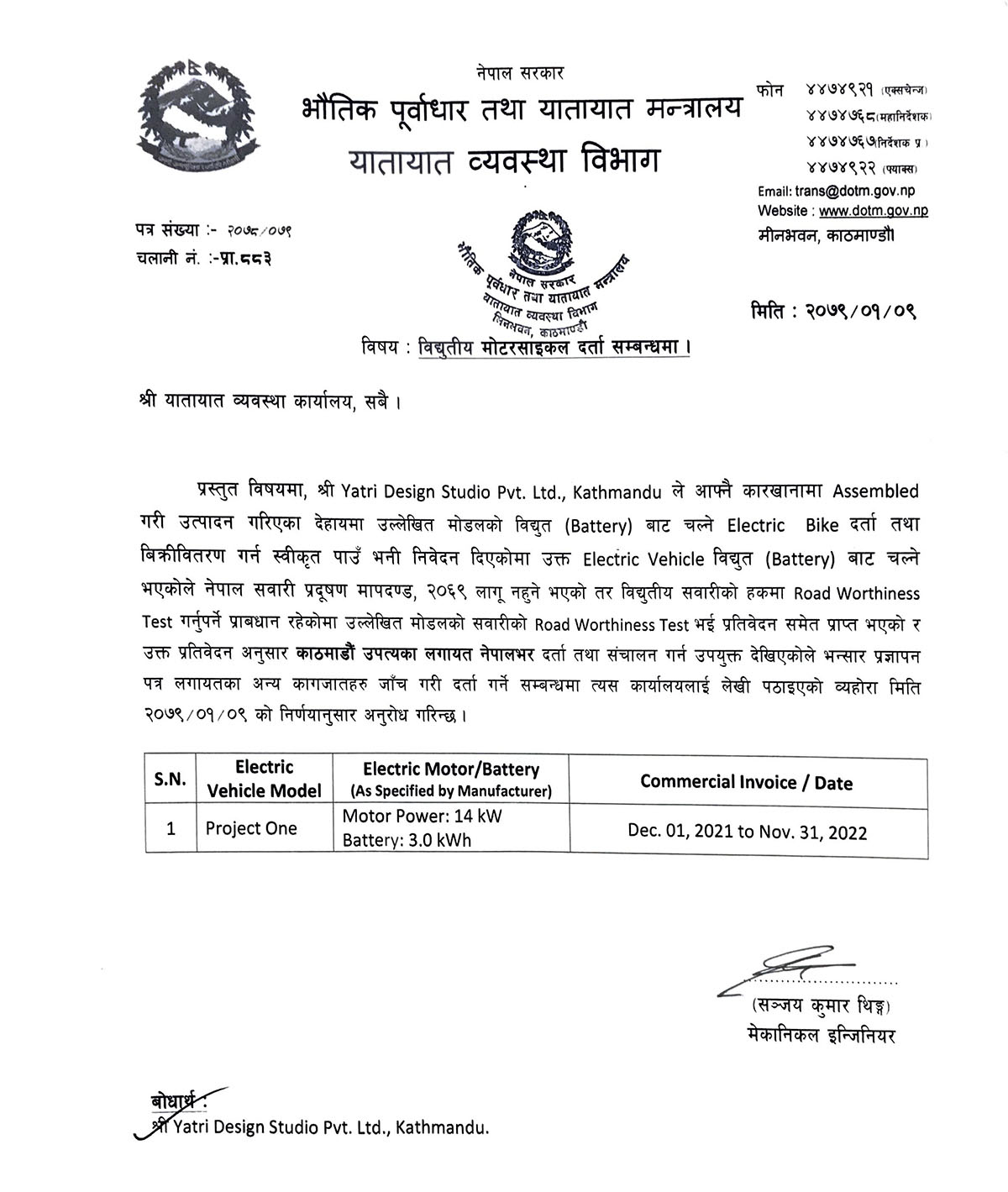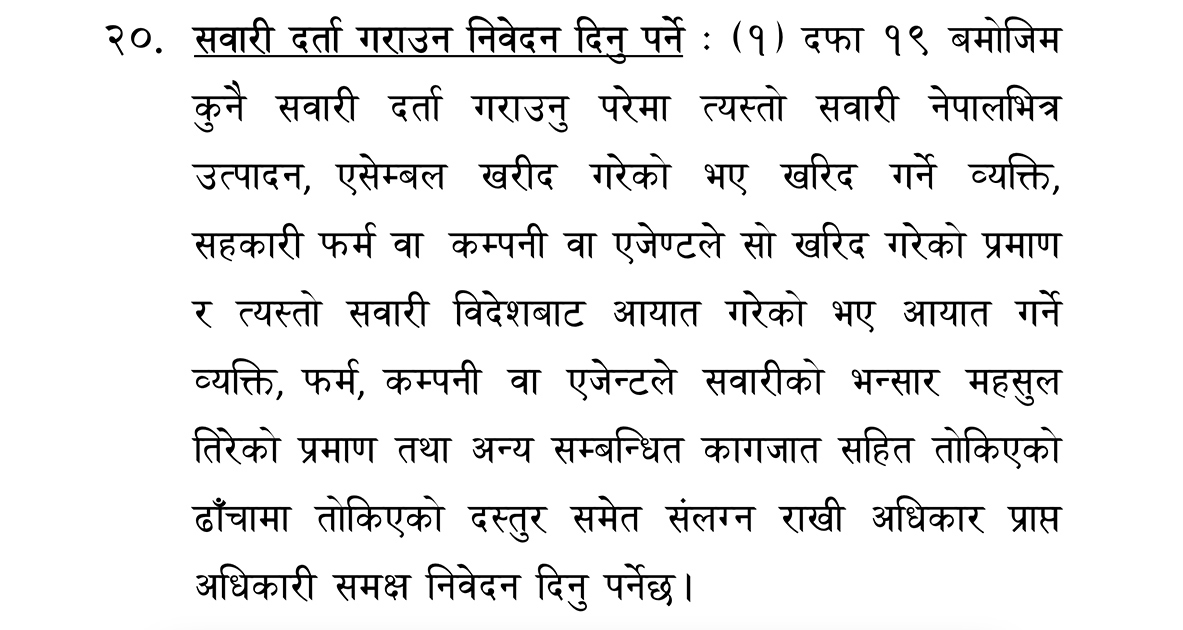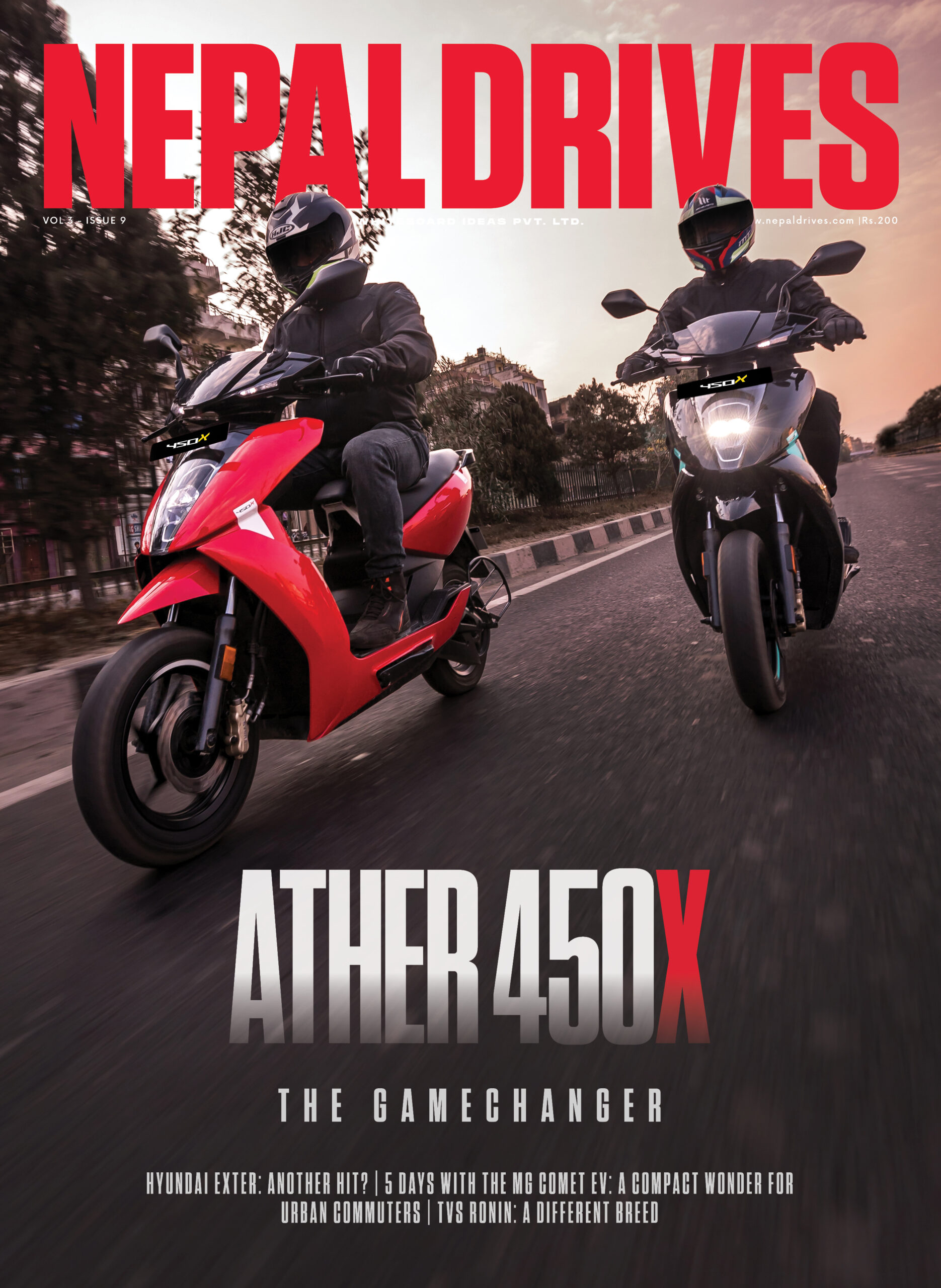Roadblock For ‘Homegrown’ EV Makers; Outdated Policies Show Why.
Share



Presenting the budget for the fiscal year on April 2021, the then minister of finance, Bishnu Poudel, said that a policy will be taken to replace the vehicles running on petroleum products with electric vehicles by 2031 A.D. “We would also like to invite the top 10 EV brands to set up their own manufacture and assembly plants in Nepal.”, he further added.
These announcements were expected to witness a slew of positive policy developments around the electric mobility sector. However, the case was different. Enter Yatri Motorcycles, a homegrown electric motorcycle manufacturer which has been working to develop performance-focused electric vehicles from the ground up, in Nepal. Or, let’s say, the homegrown EV maker facing an ongoing battle to register homegrown vehicles in Nepal.
December 2017: Yatri registered as a company at the Office of the Company Registrar with the aim to develop electric vehicles in Nepal and conduct sales and distribution of these said vehicles in Nepal and beyond. The company then immediately began applying for permissions and certificates from various ministries and departments. This certificate granted Yatri permission to set up a ‘cha’ category workshop to build our own chassis indigenously in Nepal.
Amongst many certificates, the most important one was the permission to build its own chassis which was awarded by the Department of Transport Management (DOTM) under the Ministry of Physical Infrastructure and Transport (MOPIT). This certificate granted Yatri Motorcycles permission to set up a ‘cha’ category workshop to build its own chassis indigenously in Nepal. Contrary to others, Yatri doesn’t bring CKD parts to assemble from foreign Original Equipment Manufacturers (OEMs) which several other companies are doing.
December 2019: Yatri Motorcycles officially reveals Nepal’s first electric motorcycle, Project Zero.
April 2021: Yatri Motorcycles showcases the pre-production unit of the P-1 dual-sport electric motorcycle.
November 2021: After several years of development, prototyping, testing, iterating, and further development, the company becomes ready with a pre-production unit of P-1 for Roadworthiness Test from another department of MOPIT (Vehicle Fitness Center, Teku). The company successfully passes all the Roadworthiness Tests and receives another certificate awarding the approval to be able to register and operate the P-1 vehicles in Nepal. This certificate was accompanied by a recommendation letter addressing yet another department of MOPIT (Vehicle Registration Office, Gurjudhara) to register the bike.

What is a Vehicle Identification Number (VIN)?
To register a vehicle – the registration office requires a Vehicle Identification Number (VIN) inscribed on the chassis and engine number (in Yatri’s case, the motor number). Since there are no other vehicle manufacturers who indigenously build their own chassis in Nepal, there is no authority to regulate the VIN. Hence, Yatri took an initiative to apply to SAE USA which awards the VIN for the jurisdiction where no local authority provides this. As such, Yatri became the first OEM from Nepal to receive a VIN code for Nepal. Yatri abides by ISO3780 to create a unique VIN for each chassis (or motor number) to guarantee traceability.
Carrots or Sticks?
Although Section 20 of the Motor Vehicles and Transport Management Act 2075 for Bagmati Province has mentioned registration for ‘Made in Nepal’ vehicles, the dated protocol at the Vehicle Registration Office in Gurjudhara states that vehicles shall be registered as per the VIN and Engine number written on the Pragyapan Patra (Customs Declaration Form) received at the Customs Clearing Office.
 Section 20 of the Motor Vehicles and Transport Management Act 2075 for Bagmati Province
Section 20 of the Motor Vehicles and Transport Management Act 2075 for Bagmati Province
However, there is no provision for registration of ‘Made-In-Nepal’ vehicles in the amendment Transport Management Guide (Yatayat Byawasthapan Karyawidhi Nirdeshika, 2074). In sub-section 2 of section 11, it is said that a customs notification letter and customs fee are mandatory for new vehicle registration. It is stated in the regulation, “For the certificate of vehicle registration, it is mandatory to submit the complete customs declaration form and the receipt of customs duty payment.”
 Section 11 of the Yatayat Byawasthapan Karyawidhi Nirdeshika, 2074
Section 11 of the Yatayat Byawasthapan Karyawidhi Nirdeshika, 2074
Since P-1 is entirely a ‘Made-In-Nepal’ product, the company has the Customs Declaration Form of raw and unprocessed parts only which has already been submitted to the Vehicle Registration Office in Gurjudhara. Yatri’s file has been moving between the Bagmati Provincial government, DOTM and MOPIT for over a year now with no clear solution in sight. The government’s confused and contradictory approach to registering Nepal-made vehicles has become a major roadblock for homegrown EV makers.
After constantly working with government officials and departments for over a year, Yatri Motorcycles provided feedback in formulating an 85-page directive that would essentially solve all the problems in registering a ‘Made in Nepal’ vehicle. However, for this directive to be implemented by the DOTM, there has to be an amendment in Niyamawali which needs to go through the Minister’s Cabinet approval. As per Yatri Motorcycles, everything except the “Directive for Made in Nepal vehicles”, was approved in the last cabinet meeting. Strange.
The government’s ‘shooting itself in the foot’ with such outdated policies
The implementation of impactful, long-term policies has always been an area of debate in the country. While the need to commit to long-term policies still remains a concern, a few policies like zero excise on EVs, lower excise duties and loans up to 80 percent of the price of the electric car have promoted the adoption of EVs in Nepal. However, this is far from sufficient. The main takeaways are clear when reviewing these outdated policies.
In the near future, it’s anticipated that there will be an increase in start-ups across the electric mobility sector. From our perspective, there is no clear regulation in sight to govern the registration of Nepal-made motor vehicles. Yatri’s concerns have validity because the lack of clear leadership and vision in the government has been the single biggest root cause for this unacceptable delay in registration. Further, the legal inconsistencies and the lack of objectively defined policies have complicated the requirements for Yatri Motorcycles.
With the world stepping towards EVs on a larger scale, it is essential that we make that transition quickly for a cleaner, greener future. And if we are to accommodate the 2031 A.D. fossil fuel vehicles ban, the government should act early and decisively for the growth of homegrown EV makers.












